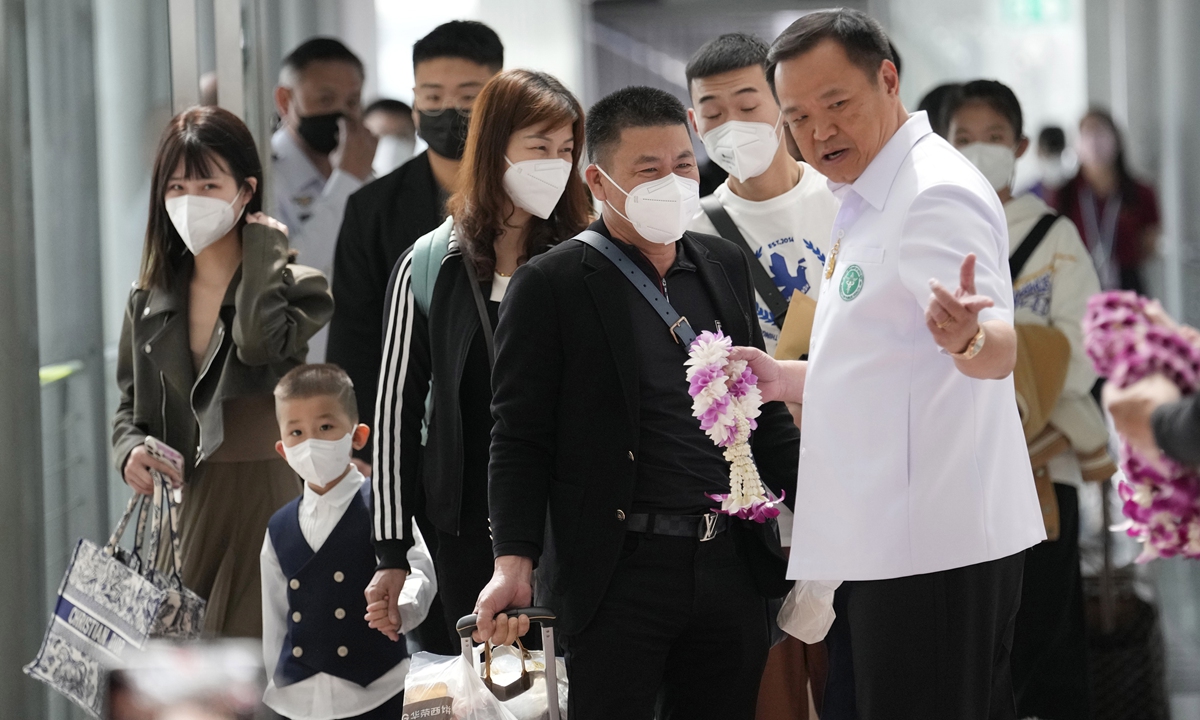After China lifted most of its entry restrictions on Sunday, many Chinese people have rushed to make travel plans and renew their travel documents ahead of the upcoming Spring Festival holidays for a vacation abroad, foretelling the great potential of Chinese tourists ushering in a recovery of the global tourism industry.
Some foreign countries have rolled out red carpets to welcome the first batch of returning Chinese tourists, holding great expectations for a robust recovery of Chinese tourists and a strong boost to local economies throughout 2023.
After suspending their outbound travel plans for three years due to the pandemic, many Chinese people made their first stop at 3,200 local exit-entry administration bureaus nationwide to renew their passports, after services for passport application and renewal of tourism and family/friend visit purposes were resumed.
At a bureau in Beijing, the Global Times learned from Liu Jing, who is in charge of services for Chinese nationals, that the number of inquiries and applications started to rise following the announcement of “class B management” for COVID-19. As of Monday, applications and handling volumes have returned to pre-COVID levels.
“Even before the pandemic, December and January are peak months for passport-related services because of student demand, and many people also choose to travel abroad during the holidays,” Liu said.
Standing in long lines, a woman surnamed Gong and her husband came to renew their passports, which expired in 2022, to revive the travel plans that were made three years ago.
“We had planned go to Spain in the spring of 2020,” Gong told the Global Times. The couple expressed great excitement about a trip to Spain for a family reunion with their child.
The exit-entry administration bureau has made their hotline service available 24/7 to handle the mounting inquiries and adjusted their staff arrangements in line with online reservations to shorten public waiting times, the Global Times learned at the bureau.
The Gong couple were two people out of many Chinese whose enthusiasm for an immediate overseas trip after the policy relaxation has driven up search statistics on travel platforms.
Data from Trip.com Group, a Shanghai-headquartered online service, shows that as of January 5, overseas travel orders for the Spring Festival golden week, which is from January 21 to 27 this year, skyrocketed 540 percent year-on-year, and average spending per order increased 32 percent.
Xu Xiaolei, marketing manager at China’s CYTS Tours Holding Co, told the Global Times that searches and bookings for flight tickets, hotels and visa service agents have tripled, and even grown fivefold for the most popular destinations.
Southeast Asian countries, with their geographical proximity and favorable policies, such as visa exemptions or visa upon arrival, are among the most popular places for Chinese travelers.
Data by Trip.com shows that Thailand, Malaysia, Singapore and Indonesia are among the top 10 popular countries and regions. Other popular destinations include New Zealand and Australia.
A travel agent surnamed Song, who runs customized high-end group travel services, focused his business on domestic trips over the past three years. In the past two weeks, he has been busy reaching out and resuming contacts with his partners, including local travel guides, transport firms and hotel owners, to prepare for “a return to the extensive global market.”
Song will take two 10-person seven-day tours to Malaysia in mid- and late-January, which was booked out in late December 2022 when the relaxations on entry restrictions were announced. He is planning more tours to Thailand and Cambodia when conditions are ripe.
Media reports are proliferating of tourism industry practitioners in foreign countries being “more than relieved” to see the return of Chinese travelers.
Currently, travel platforms only offer single-category products, meaning travelers have to purchase flight tickets, accommodation and tickets for local sightseeing spots separately. Xu predicted that with further policy adjustments allowing travel package products and group tours, likely in the first quarter of 2023, the potential will be further unleashed.
Red carpet vs cold water
Thailand rolled out the red carpet for Chinese arrivals on Monday.
Senior Thai officials, including Public Health Minister Anutin Charnvirakul, Transport Minister Saksayam Chidchob and Tourism and Sports Minister Phiphat Ratchakitprakarn, greeted the first group of Chinese tourists – 269 passengers who arrived on Monday noon via Xiamen Air flight MF833. Officials were also at hand to distribute orchid garlands, souvenirs and Chinese-language leaflets with tourist information, Nation Thailand reported.
Unlike some Western countries, Thailand does not request negative nucleic acid test result for Chinese travelers. It also scrapped on Monday the requirement of proof of COVID-19 vaccinations for inbound international travelers.
“Thailand looks forward to the return of Chinese tourists,” Thai Ambassador to China Arthayudh Srisamoot told the Global Times on Monday. Chinese passport holders can enjoy visa on arrival in Thailand for up to 30 days of stay from now until the end of March 2023, and “consulates in China are preparing for the resumption of tourist visa applications submitted via tour companies,” the ambassador said.
Before the pandemic, China had the largest number of visitors to Thailand and highest growth rates. In 2019, 11 million Chinese traveled to Thailand.
It is estimated that 300,000 Chinese will visit Thailand in the first quarter of 2023 and that number could reach 5 million by year-end, according to the Thai Tourism Authority. Analysts predicted that the reopening of China will help lift Thailand’s 2023 GDP by 0.6 percentage points.
Malaysia is planning to assign staff who can speak Putonghua at international airports nationwide to assist Chinese travelers and make their arrival process smoother.
Besides speeding up the process at customs points without affecting travelers from other countries, related steps can also highlight Malaysia’s friendly nature to welcoming travelers from China, Malay Mail quoted Tourism, Arts and Culture Minister Datuk Seri Tiong King Sing as saying.
The country expects 1.5 to 2 million Chinese tourists in 2023.
Nepali Ambassador to China Bishnu Pukar Shrestha told the Global Times on Monday that there has been an increase in visa applications and they are hopeful that more Chinese will visit Nepal and enjoy the beautiful nature and rich culture of the country.
As an Oceania country favored by many Chinese travelers, New Zealand said it would not require travelers from China to be tested for COVID-19.
The government on January 4 said imposing entry restrictions on travelers from China was not “required or justified.”
Officials have done a public health risk assessment, including working through scenarios of potential case numbers among travelers from China, and this confirmed that these visitors won’t contribute significantly to COVID case numbers, said the country’s COVID-19 Response Minister Ayesha Verrall.
It is widely believed that the return of Chinese tourists will bring a strong boost to the tourism economy. In 2019, about 150 million outbound trips were made by Chinese travelers. According to the UN’s World Tourism Organisation, Chinese tourists spent US$254.6 billion overseas that year, topping all countries and accounting for almost one-fifth of global tourism spending.
Analysts stressed that some countries that use public health excuses and impose discriminatory policies solely on Chinese travelers will miss the opportunity of benefiting from the first wave of Chinese tourists.
Chinese Foreign Ministry spokesperson Wang Wenbin reiterated that amid some countries’ discriminatory measures and travel alerts against China, the country has been prompt, open and transparent in its sharing of virus mutation monitoring and infection situations.
Regretfully, some countries insisted on discriminatory measures regardless of science and facts, Wang said, adding that China firmly opposes it and will take reciprocal measures. China calls for joint efforts to ensure safe and smooth personnel travels and to contribute to epidemic control and global economic recovery, he said.













